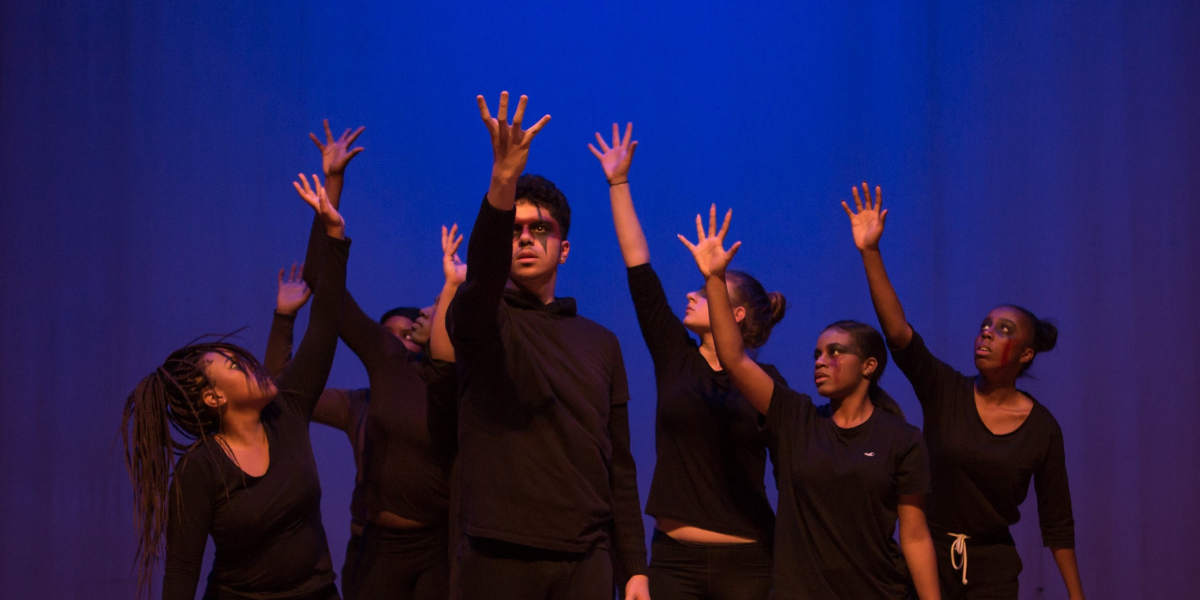
Getting ready for your Trinity Drama exam

BY: Sue Clarke: Subject Expert - Drama
10 May 2023
It's that time of year when teachers everywhere turn their thoughts towards exams and making sure that they, and their students, are fully prepared. Sue Clarke, Trinity's National Development Manager for Drama, shares her 8-week countdown with top tips for preparing for Trinity Drama grade exams.
We all know that leaving things until the last minute can lead to unwanted stress for both our students and for ourselves. For drama teachers, forward planning is essential - performance work cannot be crammed the night before! There needs to be plenty of time devoted, not only to line-learning, but in allowing performances to grow and develop in depth and complexity; for learners to create and inhabit fully rounded characters; for Key Skills to be practised and, of course, to ensure students have the breadth of knowledge required for Reflection Tasks in the exam.
Preparing for Trinity's Drama exams, like all exams, can seem daunting but, with some careful planning, you can break the work down into manageable chunks. Selecting the subject (Musical Theatre, Speech & Drama, Acting, Performance Arts or Communication Skills), grade and groupings most suitable for your learners will be the first steps in the exam process, followed by the rehearsal period. This would typically happen at least 2-3 months before you expect the exam to take place, so make sure you have read and understood the task requirements and criteria, and that you select the text pieces, early on. As you near the exam itself, it is useful to check all the necessary exam requirements in order to avoid any last minute panics.
Below is an 8-week countdown checklist for teachers of Trinity Drama exams to help keep everything on track. By following this countdown checklist, or creating your own, you can plan ahead, avoid any hiccoughs and help your students feel confident, prepared and ready to perform at their best in their Trinity exams. And when the exam day does arrive, you will be able to reap the rewards of all that hard work and enjoy the moment, knowing you did everything you could to support your students along the way.
8 weeks before the exam
Book the exam: For face-to-face exams, it is essential that your centre books their exams at least 8 weeks in advance as this secures the date and the examiner. The centre will need to ensure that they are able to meet the minimum exam fee requirement before doing this. Information about how to become a Trinity Drama centre, how to book your exam session (including the booking form), and what administration needs to be done ahead of the exam session can be found on our website. On this page there is also contact details for your Regional Coordinator if support is needed.
NB For digital exams, you only need to enter candidates when they are ready so no advanced booking is needed.
6 weeks before the exam
Reasonable adjustments: Requests for any adjustments to exams for candidates with additional needs should be made 4-6 weeks prior to the exam. Further information and request forms are on the website.
1 month before the exam
Finalise the repertoire: The candidate has been working on their pieces for a while but now is the last chance to ensure that those pieces really allow the candidate to demonstrate their abilities. Will they give the candidate the best opportunity to achieve the best mark possible? Also, double check the texts fully meet the exam criteria and task requirements. For example, is it long enough? If a piece needs to be changed, this is the last opportunity to do it if there is to be enough time to do the new piece justice.
Review the exam syllabus specifications: Ensure that exam-specific skills practice has been built into lesson time. In other words, regularly practice the Key Skills task requirements for each subject, such as improvisation tasks in the Acting specification, sight reading in Speech and Drama, Connection to the Lyrics in Musical Theatre, etc. For solo and pair exams, time should also be regularly set aside for candidates to practise answering questions for the Reflection Tasks.
3 weeks before the exam
Exam timetabling: Centres will need to create their timetables on the Trinity portal three weeks before the exam. If not managing the timetabling yourself, you may wish to liaise with the person doing it about how best to organise the candidates. For example, if a candidate suffers from nerves, would it be best to schedule them earlier in the day so that they don't have to wait?
2 weeks before the exam
Organise a mock exam: Organise a mock exam for your students to give them a chance to perform in front of an audience, or stand-in examiner, and receive feedback on their performance. This then gives enough time to make any alterations needed before the exam itself.
Review performance skills: Review essential performance skills such as projection, diction, expression and movement.
1 week before the exam
Make sure your paperwork is organised: It is the centre's responsibility to print and distribute all required paperwork for the day of the exam. Make sure your candidates have their appointment slips in advance.
Plan for the exam day: Ensure your students are well prepared for the exam day. This includes knowing the location and time of the exam, ensuring they all have the necessary materials (for example, scripts or scores/lyrics sheet), and allow themselves sufficient time for warm-up and relaxation before the exam. It is also useful to discuss with the candidates the way the exam will be run, from their entrance into the exam room and the initial conversation with the examiner, the performances and how to introduce them, and the reflection section of the exam. This 'talk through the exam' activity can go a long way to easing the nerves of the candidate.
Final rehearsals: Conduct a final rehearsal of the exam pieces and exam-specific skills.
The day of the exam
As the teacher, you have now done your job and it is time to hand over to the candidates to do their bit, so here is some advice to give candidates:
- Arrive at the exam location early to allow for warm-up and relaxation before your exam
- Try to stay calm and focused. Trust that you have done enough; that, if you forget a line, you will be able to get through it, and that the examiner wants you to do well. Concentrate on deep breathing to alleviate those butterflies
- Be in the moment, do your best and, most of all, enjoy it! After all, this is the moment you have been working towards.
Break a leg everyone and the best of luck in all your exams!
For further support in preparing your students for their exams, look at our resource How to help your candidate avoid a drama exam referral.
Photo by Rainier Ridao on Unsplash
Related posts
BY: Natalie Christopher




Comments & Replies